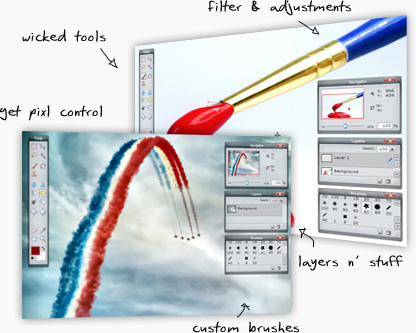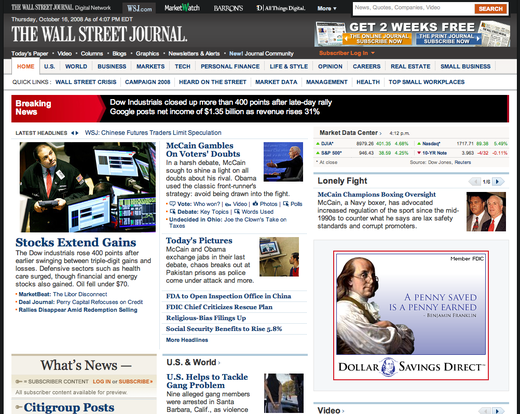
“Pixlr is a free online image editor, jump in and start edit, adjust, filter.” I dig the way the arrows/text add a touch of context to these screenshots.
You’re reading Signal v. Noise, a publication about the web by Basecamp since 1999. Happy !

Now: The creator of Vooza, "the Spinal Tap of startups." Previously: Employee #1 at 37signals and co-author of the books Rework and Getting Real.

“Pixlr is a free online image editor, jump in and start edit, adjust, filter.” I dig the way the arrows/text add a touch of context to these screenshots.
What we’ve found: When it comes to spreading a story, the mainstream media isn’t as important as the micromedia. Being written up at the right blogs has had way more impact for us than the press we’ve gotten in big-circulation publications.
Traditional media is losing ground
“10 reasons why newspapers won’t reinvent news” [via JK] explains why papers are having a tough time keeping up with the web:
Newsrooms don’t trail the leading edge simply because they’re too dumb to keep up…Most newspapers can’t see what’s coming…Most newspaper payrolls are bloated with pluralities of resentful Luddites who struggle with the complexities of e-mail…Inertia, uncertainty and toxic paralysis rule most newspaper companies…In 2008, all meaningful political discourse — the essential element of social currency — takes place on the Web. Print (and televised) political coverage is now but a pale shadow of the real action online.
This bit from “On the Bus, But With No Reason to Go?” [Washington Post], an article about the evolving role of the press in the presidential campaign, shows the impact: The mainstream media just doesn’t matter that much anymore.
Obama advisers have concluded that newspaper and magazine stories no longer have the same resonance but that a brief item by, say, Politico bloggers can spread like wildfire.”
We’ve noticed a similar trend in our sphere too…
Time vs. Daring Fireball
We’ve been written up in big mainstream publications like Wired and Time, but we’ve found that we actually get more hits when we’re profiled on sites like Daring Fireball or Lifehacker. Links from these places result in bigger spikes in our traffic and sales.
When 43 Folders’ Merlin Mann lists one of our products at his site, we get thousands of new visitors. During a recent 37signals Live we were conducting, Digg’s Kevin Rose posted a note to Twitter that he was watching us. We instantly saw a bump of 200 viewers. Articles in bigtime publications are nice and sound impressive, but they don’t result in that level of direct, instant activity.
These smaller sites don’t have the same volume of readers as, say, Newsweek, but the people who do read them actually care about what they have to say. There’s a relationship. The audience isn’t made up of random readers, it’s people who think a certain way.
Continued… Hands down my fave iPhone app: Instapaper (created by Marco Arment).
Hands down my fave iPhone app: Instapaper (created by Marco Arment).
Whenever I come across a long article online that looks interesting — Bill Simmons’ list of the best sports pieces ever written is where I started — I click Instapaper’s “Read Later” bookmarklet and then the app automatically stores it on my phone so I can read it later.
The offline storage makes it great for subway rides in NYC.
Left: List of saved articles on Instapaper’s iPhone app.
 The app downloads a text-optimized version of each page which removes the need to zoom or horizontally pan. No more accidentally side-scrolling from a long text column.
The app downloads a text-optimized version of each page which removes the need to zoom or horizontally pan. No more accidentally side-scrolling from a long text column.
Left: How a stripped down article looks onscreen.
“Learn your way around a Mac” = friendlier language than the typical “Take a tour…” (seen here).
Interesting to see that, at the end of the Macbook features page, Apple devotes a large block to pimping its support efforts (“Your own team of experts.”).
![]()
The Energy Saver icon in System Prefs goes green. [via Treehugger]
The economic crisis might leave growth-oriented companies like Twitter with little choice but to start focusing on the bottom line. “Now it doesn’t matter if you want to scale first because you just can’t have it,” said Paul Kedrosky, a senior fellow at the Kauffman Foundation. “You have the luxury of being able to decide between small and focused on revenues or large when you have capital. When there isn’t money, there’s no choice.”
Be fearful when others are greedy, and be greedy when others are fearful…What is likely is that the market will move higher, perhaps substantially so, well before either sentiment or the economy turns up. So if you wait for the robins, spring will be over.

WSJ redesigned. What do you think?
According to Bill Simmons, overcrowding plagues NFL pregame shows. His explanation for why the trend keeps getting worse:
They don’t like firing people or eating contracts, but they loooooooove hiring people. Nothing makes a network exec happier than announcing, “We’re bringing in so-and-so!” And the sheer power of numbers makes shows feel like a bigger event than they actually are, so instead of choosing between Emmitt and Keyshawn, or Marino and Boomer, or Tiki and Bettis, they just keep both under the “bigger is better!” premise. Even if it inadvertently clogs up their shows and flies against the face of everything that has ever worked well on a Sunday pregame show.
Unfortunately, cable news networks seem to be picking up this fumble and running the wrong way with it. Here’s MSNBC’s wall of experts covering the Wall Street crisis. Jon Stewart labelled it “the decabox.”

In a connected world, countries, governments and companies also have character, and their character — how they do what they do, how they keep promises, how they make decisions, how things really happen inside, how they connect and collaborate, how they engender trust, how they relate to their customers, to the environment and to the communities in which they operate — is now their fate.